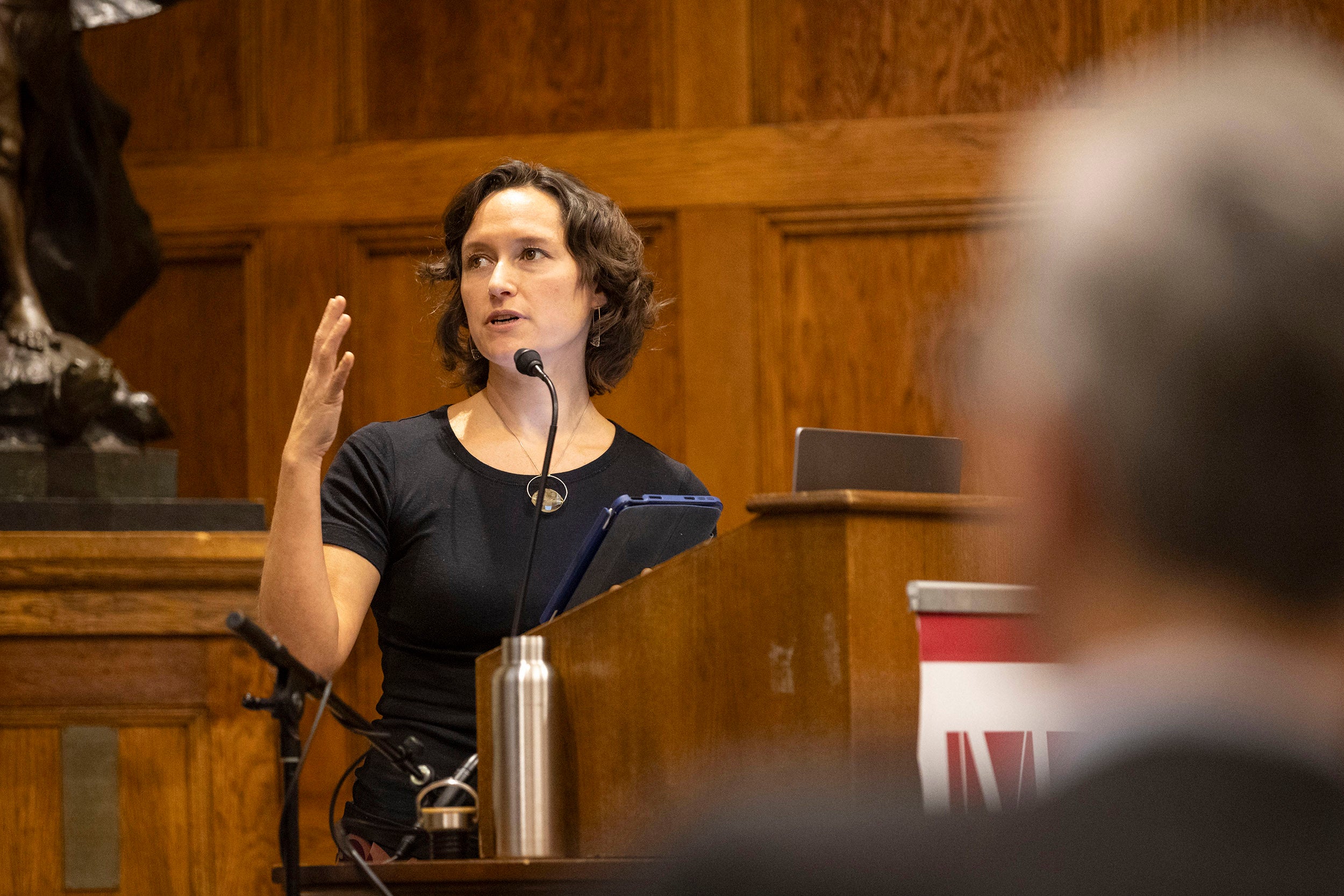
Heather Houser, who studies the intersection of climate and reproduction, says it’s difficult for researchers to track the reason couples choose to go childless, noting there’s often a big gap between intentions with fertility and actions ultimately taken.
Niles Singer/Harvard Staff Photographer
Thinking about having baby? Even during climate crisis?
Scholar says increasing numbers of young adults are weighing what is best for planet, children
As the climate crisis ramps up, more young people are considering the ethics of whether to have children, and if so, how many. Some worry about how children could damage the planet; others about how the planet could damage children.
For Heather Houser, who studies the intersection of climate and reproduction, the question “Is it OK to have children?” is the most common one she gets regarding her work. But it’s only a small part of the complex web of issues surrounding what she calls the “reproduction-climate nexus.”
“We’re not only calculating a GHG [greenhouse gases] emissions number that drives climate anomalies and catastrophic impacts,” said Houser, the Mody C. Boatright Regents Professor in American and English Literature at the University of Texas, Austin, in a recent Environment Forum event. “We’re calculating what it means to continue, how consent balances out force, what it means to be pessimistic about humanity or optimistic for the planet, and how that equation factors into the violences of colonialism and medical apartheid.”
Houser spoke with Assistant Professor of English Sarah Dimick about diverse philosophies and ethics that scholars and activists use in their arguments about reproduction amid the climate crisis. Much of the discussion drew from Houser’s current book project, “Our Bodies, Our Climate: Rethinking Reproduction and Family in the 21st Century.”
In a 2021 Pew Research Center survey, only about 5 percent of childless adults cited “climate change/the environment” as their reason for not having children. But Houser said it can be difficult for researchers to track this kind of issue in a meaningful way, noting there’s often a big gap between intentions with fertility and actions ultimately taken.
“Economic pressures are often more obvious. ‘Can I afford to have a child if I want to?’ That can be more tangible,” Houser explained. “But the personal, psychological, or existential mess of things that someone might be considering can be harder to parse.”
Some activists and scholars adopt an “anti-natalist” philosophy when thinking about the climate. Houser cited Australian scholar Patricia MacCormack and groups like the Voluntary Human Extinction Movement among those who believe that ending human reproduction is the kindest thing for the planet.
“I think of their pessimism as being oriented toward an optimism for the planet that requires, in MacCormack’s phrasing, a graceful bowing out of humanity,” Houser said.
Others believe ending their family line before climate change renders the planet uninhabitable is the kindest thing for future children.
“Many people anticipate joy and possibility, and it will counterbalance whatever’s to come for their particular child,” Houser said. “But many … see millions of people and other beings injured or losing their lifeways, homes, and even facing death, given the trajectory we are on with climate action.”
Houser doesn’t believe organized population control is a good method for addressing climate change, in part due to its history of having been employed in the service of racist, sexist, colonialist agendas. Such programs bear very real historical implications for many populations, including survivors of genocide and populations who have been targets of forced sterilization campaigns, such as Black and Indigenous populations in the U.S. For these populations, reproducing in the face of extinction can be a “decolonial act of survival.”
“We cannot think about whether an optimism of the planet requires humans to will their extinction without reflecting on how patriarchal white supremacy has created those regimes of reproductive control,” she said. “I don’t think we can face the end of babies without accounting for who that control targets, and especially how genocide — and fears of it — have shadowed marginalized women’s fertility here in the U.S., but also globally.”
Houser also noted there are practical reasons to avoid population control initiatives. It can, for instance, take a long time to change fertility patterns in any significant way, and fertility rates are already declining naturally, removing much need for intervention.
Some part of the reproduction decision is increasingly being made for us. Houser asked the audience to consider the effects of pollution and climate on reproductive biology. Research showing the impact of endocrine disruptors, air pollution, wildfire smoke, and extreme heat on sperm counts, fertility, birth and stillbirth rates create questions about the feasibility of reproduction in the future, she said.
Most people will not consider every facet of the climate-reproduction nexus when making their decisions, Houser said, though some will likely prioritize a few issues. But, she argued, reproduction should become a central part of the climate change conversation.
“We need to take this all in,” she said. “Not to prescribe whether it’s OK to have a child — or only one — but to account for the seismic ground on which we’re stepping when climate and reproduction intersect.”




